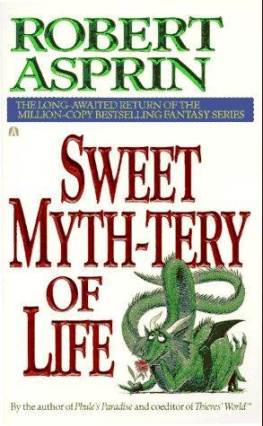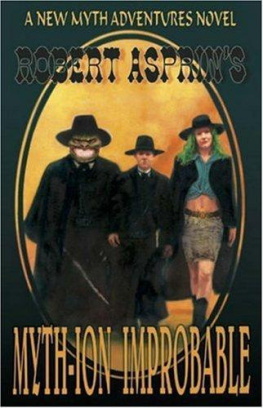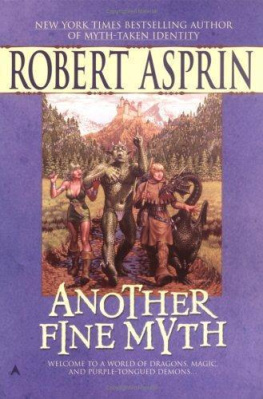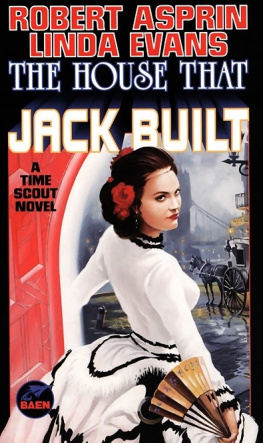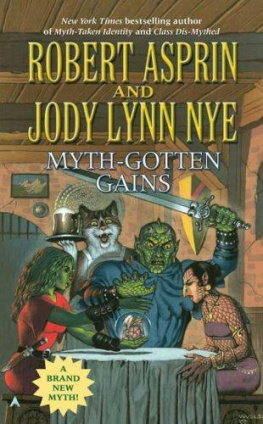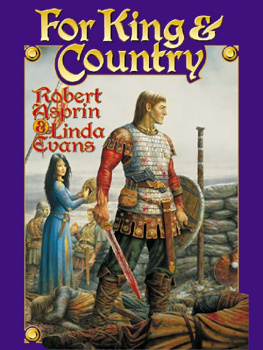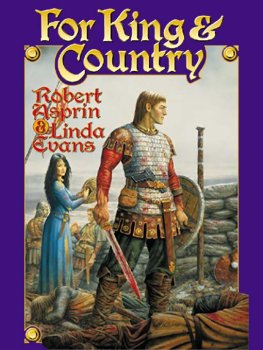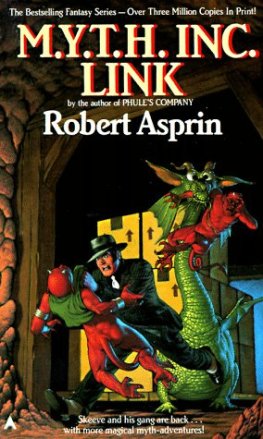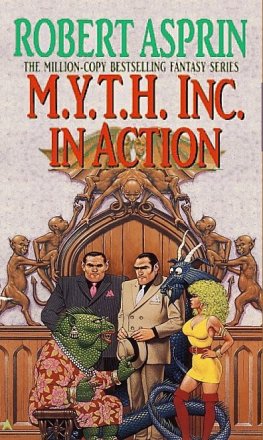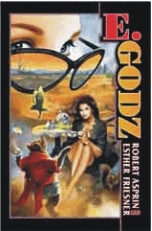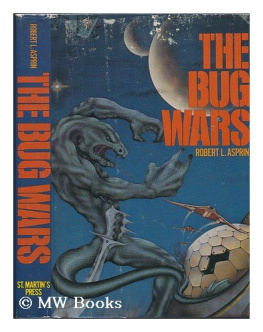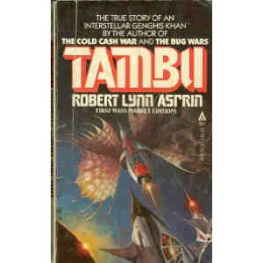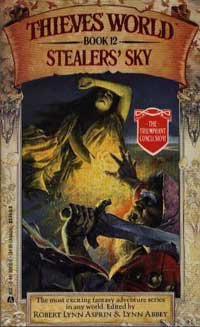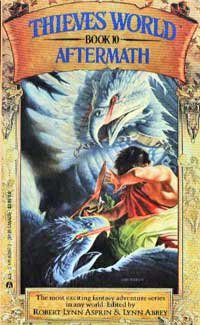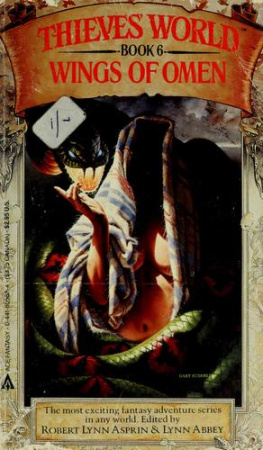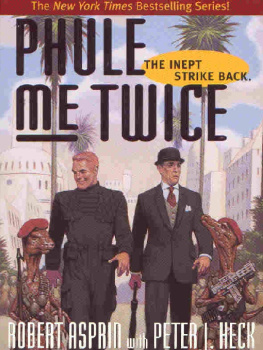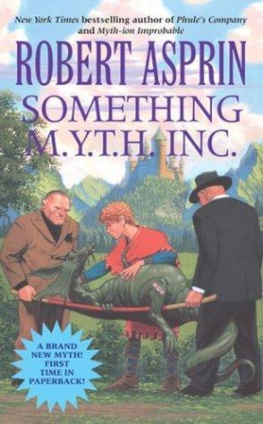Robert Asprin - Wings of Omen
Here you can read online Robert Asprin - Wings of Omen full text of the book (entire story) in english for free. Download pdf and epub, get meaning, cover and reviews about this ebook. genre: Romance novel. Description of the work, (preface) as well as reviews are available. Best literature library LitArk.com created for fans of good reading and offers a wide selection of genres:
Romance novel
Science fiction
Adventure
Detective
Science
History
Home and family
Prose
Art
Politics
Computer
Non-fiction
Religion
Business
Children
Humor
Choose a favorite category and find really read worthwhile books. Enjoy immersion in the world of imagination, feel the emotions of the characters or learn something new for yourself, make an fascinating discovery.

- Book:Wings of Omen
- Author:
- Genre:
- Rating:5 / 5
- Favourites:Add to favourites
- Your mark:
- 100
- 1
- 2
- 3
- 4
- 5
Wings of Omen: summary, description and annotation
We offer to read an annotation, description, summary or preface (depends on what the author of the book "Wings of Omen" wrote himself). If you haven't found the necessary information about the book — write in the comments, we will try to find it.
Wings of Omen — read online for free the complete book (whole text) full work
Below is the text of the book, divided by pages. System saving the place of the last page read, allows you to conveniently read the book "Wings of Omen" online for free, without having to search again every time where you left off. Put a bookmark, and you can go to the page where you finished reading at any time.
Font size:
Interval:
Bookmark:
Robert Lynn Asprin
Wings of Omen
INTRODUCTION by Robert Lynn Asprin
The birds of Sanctuary are black. From the hawklike predators to the smallseedeaters the native birds are black as the heart of a thief.
Hakiem, once the town's leading storyteller, had never paused to reflect on thecoloration of the birds before. At moments like this, however, when the businessof the Bey-sa's court was between members of the Beysib clans and conducted intheir own incomprehensible tongue, there was little for the Empress's nativeadviser to do but fidget and reflect. Habits evolved during long years drinkingat the Vulgar Unicorn had positioned him with his back to a wall and a clearpath to the doors-coincidentally he had gotten himself an equally clear view outa window into the courtyard below. The movement of the birds caught his eye; hefound himself watching their antics closely.
When the Beysib arrived in Sanctuary they brought, along with their gold andtheir snakes, a substantial flock of non-migratory seabirds they called the beyart-as they called their snakes beynit, their flowers beyosa and their goddessMother Bey. Every day they threw bread and tablescraps into the courtyard tofeed their winged allies. The birds of Sanctuary, who could not tell a palacecourtyard from the back door of a Maze slophouse, swarmed to this easy feast andfought savagely among themselves-though the Beysib made sure there was enoughfor all. Some black birds cawed or shrieked to drive off new arrivals, whileothers took vengeful pursuit of any bird attempting to make off with a morseltoo large to be consumed on the spot.
Two of the white beyari-the birds for whom the food was intended-soaredmajestically into the courtyard. In an instant all individual differences amongthe black birds were forgotten; they rose in a single, dark cloud to drive offthe interlopers. No, not quite all, the storyteller observed. A few clevererbirds remained behind, hurriedly bolting food while their comrades and rivalswere momentarily distracted.
The storyteller smiled to himself. From high to low everyone in Sanctuarybehaved the same-even the birds.
A flicker of white on the roof across from the window caught Hakiem's eye. Onebeyari was perched beside a black bird half-again its size. There was anoccasional flutter of wings and much head-bobbing, but neither bird was givingground. The storyteller was no regular bird-watcher; it seemed unlikely that thetwo could mate-but they certainly weren't fighting. Perhaps-
"Hakiem!"
He jerked his attention back to the court, discovering that the business hadbeen concluded and the parties dismissed. Shupansea, Beysa of the Beysib Empire,had risen onto one elbow from the supine position in which she traditionallyconducted state affairs and was staring at him with her large, amber, andinhumanly unblinking eyes. She was young, not past her mid-twenties, slender,and fair-skinned with thigh-length blonde hair that cascaded onto the pillows ina way that only the finest of silks could hope to imitate. Her breasts werebare, in the Beysib tradition, and so firm with youth that even when she movedthe dark, tattooed nipples regarded him as steadily as her eyes.
Of course, Hakiem was himself sufficiently advanced in age that such a sightleft him unmoved-almost.
"Yes, 0 Empress?"
He gave a slight bow, cutting his thoughts, and his glance, short before eitherprogressed too far. As a street storyteller he had always been polite to thosewho gave him a few coppers in return for his entertainments. Now, with the heftystipend he was receiving in gold, he was a paradigm of courtesy. .
"Come, stand beside us," she said, holding out a dainty hand. "We fear we willneed your advice in this next matter."
Hakiem bowed again and proceeded to her side with unhurried dignity. As hewalked he took secret delight in the jealous stares directed at him from theother courtiers. During his short time at court, the storyteller and the Empresshad developed a mutual respect for each other. More importantly, they found theyliked each other, a condition which had brought Hakiem favored treatment.Privately he suspected that his elevated status was not so much a compliment tohim as it was the Beysa's way of keeping her own clanfolk in line, but hereveled in the attention while he had it.
The next petitioners were ushered in and, dutifully, Hakiem directed hisattention to the problems at hand. He did not know the three Beysib in the groupsave they weren't clan Burek aristocrats and therefore must be Setmur fishermen.The townspeople he recognized at once as the pillars of Sanctuary's fishingcommunity: Terci, Omat, and the one everyone called the Old Man. Usuallycitizens of Sanctuary appeared at court in the company of Beysib clansmen whenone group or the other had a serious grievance to air, but this group radiatedno animosity at all.
"Greetings, Monkel Setmur, Clanchief," Shupansea intoned in the singsong pidginRankene which passed for a common dialect these days in the city. "Too long haveyou been absent from our presence. What matter have you brought before ustoday?"
The smallest, and perhaps the youngest, of the Beysib stepped nervously forward."Greetings, 0 Empress. We... we have come before you this auspicious day to seekyour favor and blessing on a project."
The Beysa nodded thoughtfully, though Hakiem glimpsed puzzlement in her manner.It was clear enough to him: requests for money sounded the same in any dialect."Tell us more, Clanchief," she requested.
"It is well known that the arrival of our fleet has caused havoc among the localfood sellers," the youth said carefully; he had plainly memorized his speech."As the nearby farmlands were already overworked, it has fallen to the fishingboats to provide enough food to feed not only us, but the townspeople aswell...."
"Yes, yes," Shupansea interrupted. "But what of your project?"
Monkel glanced at his colleagues for support, then straightened his shoulders."We-that is, clan Setmur and the Sanctuary fishermen-wish permission, andfinancial assistance, for building a boat."
"A boat?" The Beysa swiveled into a sitting position. "We have fifty-odd boatsrotting at anchor in the harbor. Use one of them if you need another boat."
The Clanchief nodded; he had expected this response. "0 Beysa, our boats werebuilt for long sea voyages and the safe transport of passengers and cargo. Theyare ill-suited for chasing schools of fish. For months now we have put to sea inour scout-craft beside these native fishermen and learned much of the watershere. Our friends here, with their keelless boats, cannot chase the fish to deepwater where they feed in greater numbers; our scout-craft reach the deep water,but have no holds for the fish. We will make a new type of boat-as big inside asa Sanctuary boat and as seaworthy as our scouts. We ask your permission to laythe keel... and, er, for your support."
"But why can't the big boats...?"
Hakiem cleared his throat noisily. Shupansea paused and waited for her adviserto speak. "The Beysa will require time to consider your proposal and willconsult with Prince Kadakithis before making a decision. Return tomorrow foryour answer."
Monkel looked at his Beysa with glazed eyes-totally shocked by the improprietyof a commoner speaking for the Avatar of Mother Bey-but she simply nodded andwaved her hand in dismissal. "Thank you, 0 Empress," he stammered while bowingand backing away from her. The others of his party duplicated his actions.
A short time later, after dismissing all the other courtiers, Shupansea pattedthe comer of her divan and called Hakiem to join her. "Tell us. Wise One," shesaid with a smile,"what do you see in this determination of the Setmur to buildanother boat that we do not see?"
The storyteller sank heavily onto the cushions; formality disappeared, as itusually did when they were alone. "When one reaches my age one learns toappreciate the value of time. One of the few advantages of being an empress, oreven a prince, is that you rarely have to make a decision in a hurry. In short,I was afraid that in your haste to determine if the boat were truly needed forfishing you might overlook the greater problems involved here."
Font size:
Interval:
Bookmark:
Similar books «Wings of Omen»
Look at similar books to Wings of Omen. We have selected literature similar in name and meaning in the hope of providing readers with more options to find new, interesting, not yet read works.
Discussion, reviews of the book Wings of Omen and just readers' own opinions. Leave your comments, write what you think about the work, its meaning or the main characters. Specify what exactly you liked and what you didn't like, and why you think so.

